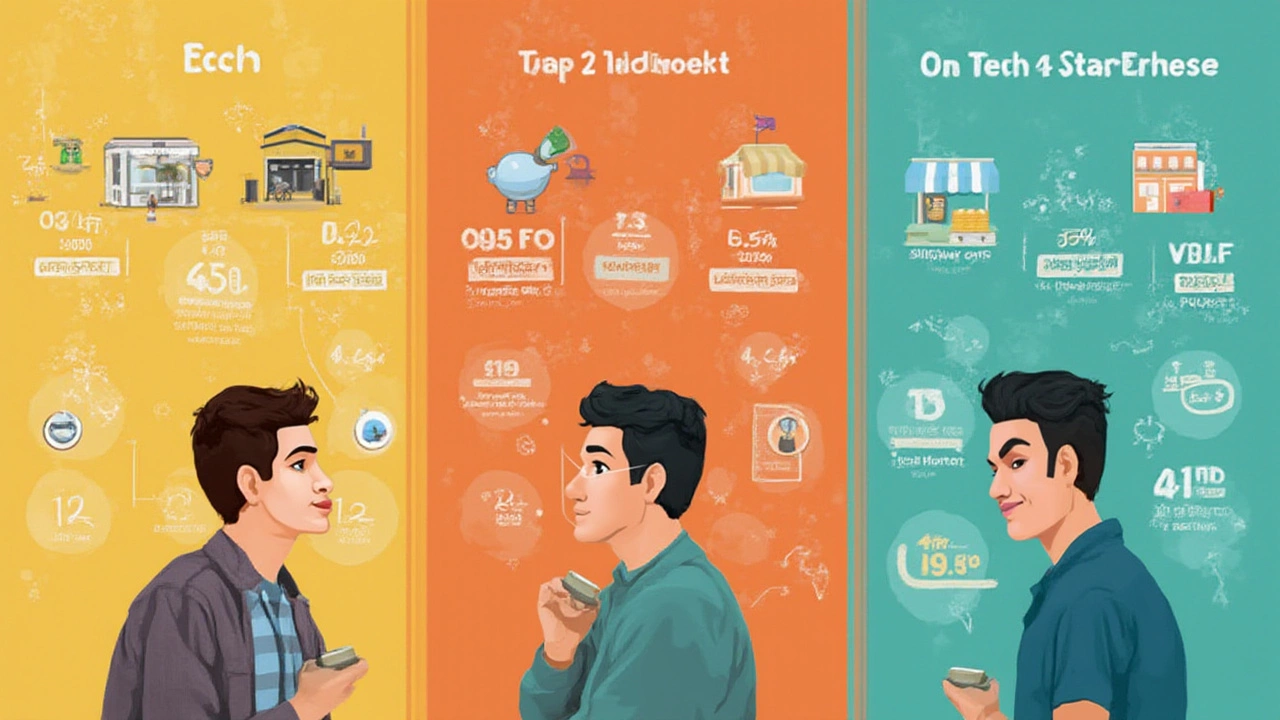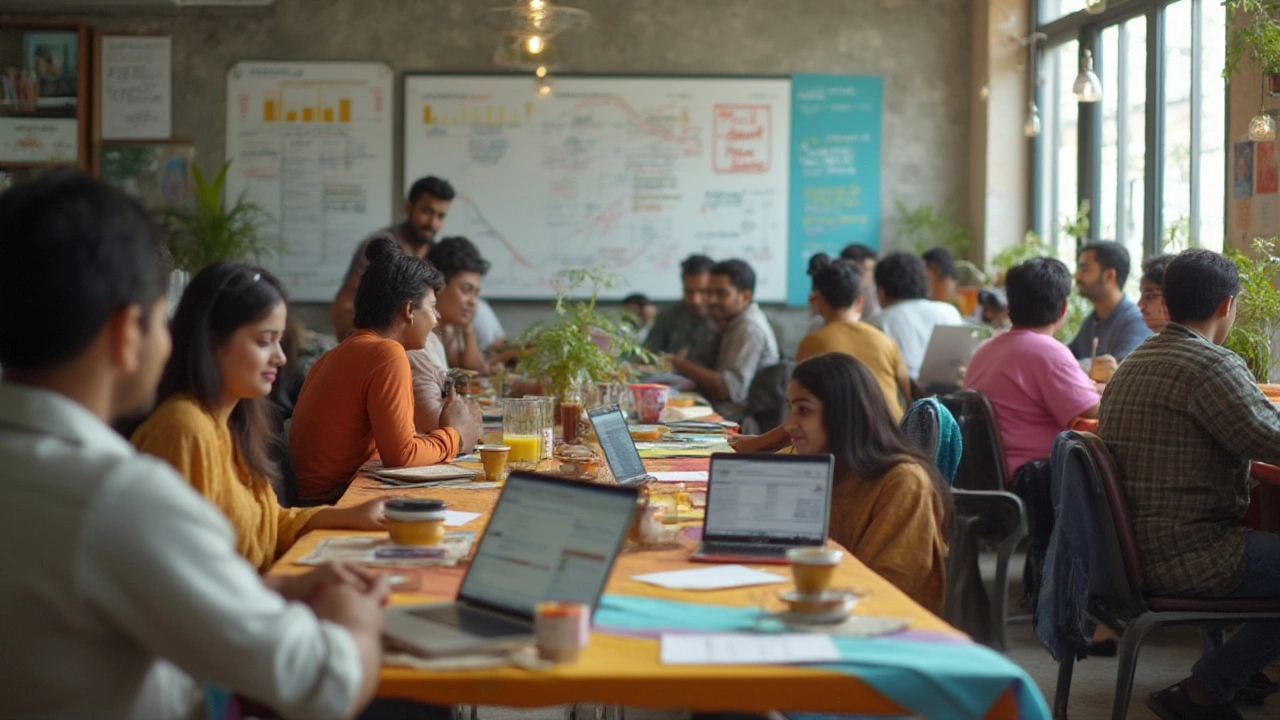If you’ve ever dreamed of launching a business in India, you’re not alone—the country sees over 80,000 startups registered just last year, with thousands more small businesses springing up quietly in cities large and small. But here’s the question that keeps most people awake: How much cash does it really take to get things off the ground? Google gives you vague numbers or some influencer’s success story, but piecing together the real costs feels like a guessing game. I know a guy in Delhi who launched a chai stall for just a few thousand rupees, and a techie in Bangalore who raised crores for an app before he even paid himself. The range is wild, but I’m here to break it all down so you don’t get lost in the chaos—or worse, run out of cash weeks in.
The Essential Costs: What Every Startup in India Needs to Budget For
Let’s get straight to the part everyone wants: the concrete numbers. No matter what business idea you have—for example, a boutique clothing store in Mumbai or a small IT services firm in Pune—certain fees hit everyone. First up comes registration and legal compliance. Registering as a sole proprietorship might set you back from ₹1,000 to ₹3,000, but if you are eyeing a private limited company, brace yourself for something closer to ₹8,000 to ₹15,000. Trademark registration can come in handy, and that will run you close to ₹4,500 per class. GST registration is free, but you’ll want to budget for a chartered accountant to handle filings—so add roughly ₹2,000 to ₹5,000 there.
Here’s the catch: a lot of folks forget about basic compliance, which can make or break your timeline and budget. Shops and Establishment Act registration, FSSAI license for food-related businesses (ranging from ₹100 for the basic license to ₹7,500+ for a state-level), and sometimes even fire and pollution certifications—all of these have separate costs and can lead to fines if neglected. If you want a digital business, expect to pay from ₹5,000 to ₹40,000 for a sturdy website, depending on features. Don’t even get me started on GST returns, which every registered business has to file—screw that up, and there are late fees straight away. Consider this stuff the "mandatory ticket to entry." Forget these, and you’re out before you start.
Setting up shop also comes with infrastructure needs—rent, deposits, and fit-outs. While smaller towns let you snag retail space for as low as ₹8,000 per month, the same in a metro like Bangalore or Delhi can top ₹75,000 or more for prime locations. Most landlords demand a security deposit, often three to six months’ rent upfront. If you’re bootstrapping, look for shared spaces: coworking desks in Tier 1 cities average ₹6,000–₹12,000/month per desk—far cheaper than a lease and perfect if you’re not sold on signing a big office contract.
Now, let’s talk gear and inventory. Most retail or food businesses need at least ₹50,000–₹3,00,000 for things like furniture, refrigerators, computers, and POS (point of sale) machines. Tech firms can get away with a couple of laptops and basic furnishings, but you’ll probably still cough up at least ₹40,000–₹80,000 upfront. If you’re dealing in products (especially stuff like clothing or gadgets), initial inventory can range from ₹1,00,000–₹5,00,000 just to have a shelf that doesn’t look empty. Digital startups save here but should budget for SaaS tools, domain names, and basic cloud services.
Here’s a quick look at the basic costs for three different business types, everything rolled in:
| Business Type | Registration & Legal Fees | Infrastructure/Office | Inventory/Tech | Marketing | First Month Total (approx.) |
|---|---|---|---|---|---|
| Retail Boutique | ₹10,000 | ₹1,00,000 | ₹1,50,000 | ₹20,000 | ₹2,80,000 |
| Cafe/Food Stall | ₹15,000 | ₹60,000 | ₹70,000 | ₹10,000 | ₹1,55,000 |
| IT Startup | ₹12,000 | ₹25,000 | ₹80,000 | ₹18,000 | ₹1,35,000 |
Notice these are all starting points—they don’t include your working capital (money set aside to survive a few slow months before you’re profitable), which can double or triple these totals, especially if you’re in a business that gives credit or needs a buffer for late-paying clients.

Industry Variations: Costs by Type of Business
Here’s where things get wild. Starting a basic YouTube channel or dropshipping operation? You might be fine with less than ₹30,000 if you have a laptop and internet. But as soon as you need a physical space, paid staff, or regulatory clearance, the numbers balloon fast. Let’s break it down by broad categories you’re likely to consider if you’re starting in India.
Retail and food businesses take a big bite out of your pockets upfront. A small food truck today goes for anywhere from ₹2,00,000 (for an old Maruti van) to ₹10,00,000 or more (for something that won’t break down every two days). Remember the kitchen and FSSAI setup costs, menu printing, and uniforms. Small restaurants need an even bigger stash: with rents, licenses, commercial kitchen gear, and at least a couple of staff, expect a minimum of ₹6–8 lakhs to be competitive and survive the first six months.
Tech startups seem cheaper but can still chew through savings quickly. Even a two-person app company in Bangalore will burn ₹1,20,000/month if you're renting a couple of desks and paying yourself a modest salary. And cloud computing, paid subscriptions, or developer tools add up monthly. SaaS companies fare better; you can find stories where founders launched with not much more than ₹50,000 (mostly for registration, minimal branding, and lean MVP development), but only if you already have skills and don’t outsource core work.
Manufacturing or export units bring the costs into a totally different league. Land, machinery, factory setup, and regulatory approvals can easily swing from ₹10 lakhs to ₹50 lakhs—or beyond for anything serious. I’ve seen textile units in Surat launched with a bank loan that barely covered the depreciating secondhand machines, but if you want to sell overseas, add customs registration, export licenses, and packaging compliance on top. That’s why many new entrepreneurs go the aggregator or trading route instead, which lets you start with a fraction of those costs—for example, sourcing goods and selling them online can be kickstarted with ₹1–2 lakhs if you work from home.
Service businesses are the scrappiest to launch. Freelance consulting, tutoring, or content creation needs little more than a phone, laptop, internet, and legal registration. The biggest expense is often marketing. You can start with just ₹10,000, but if you need to look professional with a website, digital ads, and basic branding, budget at least ₹50,000.
To get more specific, check out what various founders in 2025 are reporting for average starting budgets:
| Business Type | Low-End Startup Cost | High-End Startup Cost |
|---|---|---|
| Freelance/Consultancy | ₹10,000 | ₹75,000 |
| Online Retail/Ecommerce | ₹60,000 | ₹5,00,000 |
| Food Truck | ₹2,00,000 | ₹10,00,000 |
| Tech/App Startup | ₹50,000 | ₹3,00,000 |
| Fitness Studio | ₹5,00,000 | ₹25,00,000 |
| Manufacturing/Export | ₹10,00,000 | ₹50,00,000+ |
Remember, the numbers aren’t just about spending more up front. A lot comes down to local costs, your ability to negotiate, and whether you’re buying new or used equipment. People often save by renting or buying second-hand—for example, many Chennai-based food outlets buy used kitchen gear to save 60% versus new. Big cities will always cost more, but online businesses at least let you cut out real estate almost entirely.

Tips to Save Money and Avoid Hidden Costs When Starting a Business in India
Nobody wants to waste money on legal mistakes or sign a lease for the wrong shop size. Here are practical tips that folks overlook—stuff I learned both from my own side gigs and watching local founders thrash through the trenches.
- Start lean before you go big. Don’t buy in bulk or hire too many people before you’ve tested your business model. My friend Priya started teaching virtual yoga classes from her living room before she ever rented a studio—and she already had loyal clients by the time she signed her first lease.
- Beware the “hidden fee” trap. Beyond government registrations, budget for consultancy fees. Professional help makes things easier and reduces mistakes, but make sure you shop around—many CAs inflate charges by ₹5,000–₹10,000 more than the market rate for simple registrations.
- Use government programs and grants. India’s Startup India scheme and state-level development programs offer everything from subsidized loans to reduced registration fees. Some business owners score interest-free loans through SIDBI or state MSME promotional schemes—if you qualify, it’s basically free money.
- Don’t get bullied by landlords. Shops in hot spots ask for massive security deposits, but many new businesses cut deals for phased deposits or shorter leases. In my neighbourhood, two local coffee joints used pop-up stalls to test footfall before signing longer rentals.
- Go digital for branding and marketing. Forget expensive print flyers; Google ads or Instagram marketing let you set a daily budget and learn what resonates before spending big. One Delhi-based founder who runs a t-shirt brand pivoted to Instagram reels and influencer shoutouts, spending ₹8,000 a month—his offline spending was triple that before.
- Outsource but verify. It’s tempting to hand all your accounting or web work to the first cheap freelancer, but ask for references and sample work. Bad registrations or dodgy code can cost 10x later in fines or lost business.
- Tap your network for deals. Whether it’s getting discounted IT gear from a cousin or teaming up with friends to bulk order supplies, leverage your connections. I know a couple in Hyderabad who saved 30% on restaurant decor because their uncle runs a furniture factory.
- Watch out for seasonal costs. Things like Diwali marketing or end-of-financial-year compliance can hit hard. Plan early so you’re not cash-strapped managing last minute tax or festival campaigns.
- Test your idea before going all in. MVPs (minimum viable products) aren’t just for tech—try a pop-up, one-month social media test, or a stall at a local market. If your first sales flop, better to lose ₹5,000 than ₹5 lakhs.
- Set aside a rainy day fund. Even the best laid plans get hit by late-paying clients, surprise repairs, or government rule changes. Most experts suggest at least 3-6 months of expenses as buffer—yes, even if it feels like you could spend that on a second-hand Activa instead.
Finally, remember that startup costs aren’t a one-time expense. Growth brings new costs—GST compliance as soon as turnover crosses ₹40 lakhs (or ₹20 lakhs in Northeastern states), ESIC/Provident Fund if you hire more than 10 employees, and so on. Regulations change fast; it pays to check government portals or update with your CA every quarter.
Starting a business in India in 2025 can cost anywhere from ₹10,000 for tiny service gigs to crores for large ventures. The average small business (think local shop, starter cafe, or digital-first brand) should brace for a minimum of ₹1,00,000–₹5,00,000 upfront. Anything less is possible, but you’re going scrappy and risking bigger surprises down the line. It pays to plan, bargain for every rupee, and always – always – keep some cash for the unexpected.

